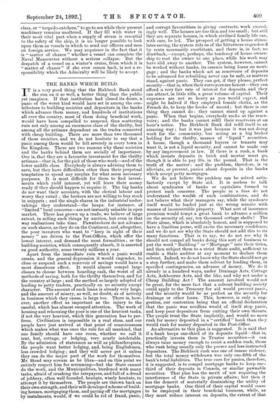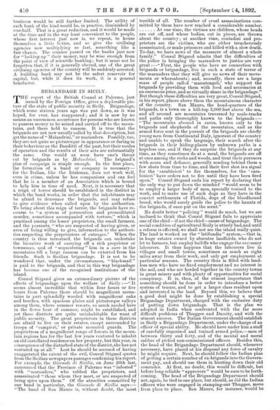THE BANKS WHICH BUILD.
IT is a very good thing that the Birkbeck Bank stood the run on it so well, a better thing than the public yet imagines. If that institution had closed its doors, a panic of the worst kind would have set in among the con- tributors to building societies and depositors in the banks which advance them money, and hundreds of institutions all over the country, most of them doing beneficial work, would have been compelled to suspend, thus scattering ruin not only among an enormous class of the thrifty, but among all the artisans dependent on the trades connected with cheap building. There are more than two thousand of these societies, and we do not hesitate to say that a panic among them would be felt severely in every town in the Kingdom. There are two reasons why these societies and the banks behind them are socially of importance. One is, that they are a favourite investment for the thrifty artisans—that is, for the pick of those who work—and of the lower middle class. Everybody is always advising them to save, but they have difficulties other than their perpetual temptation to spend any surplus for what seem necessary purposes. It is most difficult for them to find invest- ments which yield interest, yet will leave their money ready if they should happen to require it. The big banks do not want their accounts, with the clerical labour and worry they entail ; the brokers are not willing to buy stock in snippets ; and the single shares in the industrial under- takings they understand—the heaps, for instance, of "limited" local concerns—are not instantly saleable in open market. There has grown up a trade, we believe of large extent, in selling such things by auction, but even in that way realisations take time. Pawnbrokers do not advance on such shares, as they do on the Continent, and, altogether, the poor investors who want to " keep in sight of their money " are driven to the Post-Offices, which offer the lowest interest, and demand the most formalities ; or the building societies, which consequently absorb, it is asserted on good authority, some twenty millions a year. Apart from the immediate ruin which a panic would create, and the general depression it would engender, to close or suspend such a reservoir of savings would have a most disastrous effect. It would almost compel large classes to choose between hoarding cash, the worst of all methods of saving, both for the thrifty themselves, and for the country at large ; and the method so largely adopted of lending to petty traders, practically on no security except character. The amount of such loans is already very large, and the amount of misery, as well, no doubt, as of activity in business which they cause, is large too. There is, how- ever, another effect as important as the injury to the careful, which has almost escaped attention. The work of housing and rehousing the poor is one of the heaviest tasks, if not the very heaviest, which this generation has to per- form. Civilisation is impossible in a real slum, and our people have just arrived at that point of consciousness which makes what was once the rule for all mankind, that one family should have one room, whether we call it tent, hut, cottage, or lodging, very nearly intolerable. By the admission of statesmen as well as philanthropists, the people want better lodging, and, being Englishmen, less crowded lodging ; and they will never get it unless they can do the major part of the work for themselves. Mr. Stead may scream as he likes—and on this point we entirely respect him for screaming—but the State cannot do the work, and the Municipalities, burdened with many tasks, afraid of crushing the ratepayers, and full of a dread of jobbery, often well founded, hesitate, wisely hesitate, to attempt it by themselves. The people are thrown back on their own strength, and their self-developed scheme of build- ing houses, mortgaging them, and paying off the mortgages by instalments, would, if we could be rid of fraud, panic, and corrupt favouritism in giving contracts, work exceed- ingly well. The houses are too thin and too small ; but still they are separate houses, in which civilised family life can, with care, be led. The prospect of getting a house stimu- lates saving, the system rids us of the bitterness engendered by rents necessarily exorbitant, and there is, in fact, no drawback,—except, perhaps, the tendency of house owner- ship to root the owner to one place, while his work may have slid away to another. The system, however, cannot be worked without banks, its essence being loans on mort- gage ; and the banks which act as reservoirs of deposits to be advanced for rebuilding never can be safe, as matters stand, against panic. They can get, if they please, perfect security—that is, when their surveyors are honest—they can afford a very fair rate of interest for deposits, and they can attract., in little rills, a great volume of capital. Their expenses are not so heavy as you would expect, and might be halved if they employed female clerks, as the French do, to keep the books of record ; but there is one thing they cannot do : they cannot stand up against a panic. When that begins, everybody sucks at the reser- voirs; and the banks cannot refill their reservoirs at an hour's notice. The Birkbeck Bank did refill itself in an amazing way ; but it was just because it was not doing work for the community, but acting as a big broker holding for the thrifty, masses of " liquid " securities. A house, though a thousand buyers or tenants may want it, is not a liquid security, and cannot be made one by any improvement in law. If there is a rush, a bank which invests deposits in brick and mortar must go, though it is able to pay 30s. in the pound. That is the truth of the matter ; and the problem, therefore, is to alleviate, or prevent, panics about deposits in the banks which accept petty mortgages.
We do not believe the problem can be solved satis- factorily except by State aid. It is useless to talk about syndicates of banks or capitalists formed to protect such concerns. The people in a fuss do not understand the wealth of such combinations, and do not believe what their managers say, while the syndicate itself would be loaded just at the wrong minute with masses of inconvertible property. What sort of insurance premium would tempt a great bank to advance a million on the security of, say, ten thousand cottage shells ? The State alone, which is absolutely honest, and is supposed to have a limitless purse, will excite the necessary confidence, and we do not see why the State should not add this to its many functions. That is to say, we do not see why it should not compel all banks doing this sort of business to put the word "Building" or "Mortgage " into their titles, and then subject them to a strict State audit, sufficient to enable a State auditor at any moment to declare them solvent. Indeed, we do not know why the State should not go a step further, and make them solvent by lending them, in specified contingencies, an advance of money. We do it already in a hundred ways, under Drainage Acts, Cottage Acts, Ashbourne Acts, and the like, and why not under a Cheap Building Act ? The amount involved would not be great, for the mere fact that a solvent building society could apply to the Treasury for aid would prevent panic, and the security would be as perfect as the security for drainage or other loans. This, however, is only a sug- gestion, our contention being that an official declaration that the panic was needless would of itself stop panic, and keep poor depositors from cutting their own throats. The people trust the State implicitly, and would no more rush for money deposited in a " certified" bank than they would rush for money deposited in the Post-Office. An alternative to this plan is suggested. It is said that if a bank keeps one-third of its deposits liquid—that is, practically invests them in Trustee securities—it can always raise money enough to resist a sudden rush, those who rush being usually only the poorer and less instructed depositors. The Birkbeck rush was one of insane violence, but the total money withdrawn was only one-fifth of the bank's total liabilities. The true cure for panics, therefore, it is suggested, is to compel mortgage banks to keep on?- third of their deposits in Consols, or similar pawnable securities. That plan has the merit of not requiring the interference of the State in private affairs; but then it has the demerit of materially diminishing the utility of mortgage banks. One third of their capital would cease to be employed in their beneficial business, while, as they must reduce interest on deposits, the extent of that business would be still further limited. The utility of each bank of the kind would be, in practice, diminished by one-half. That is a great reduction, and it would be made at the time and in the way least convenient to the people, whose first interest just now is, we repeat, to house themselves a little better, and so give the civilising agencies now multiplying so fast, something like a fair chance. The censure passed on the banks just now for " locking-up " their money, may be wise enough from the point of view of scientific banking ; but it must not be forgotten that, if it is generally obeyed, one of the great civilising agencies of the country will be suddenly arrested. A building bank may not be the safest reservoir for capital, but, while it does its work, it is a general benefactor.



































 Previous page
Previous page